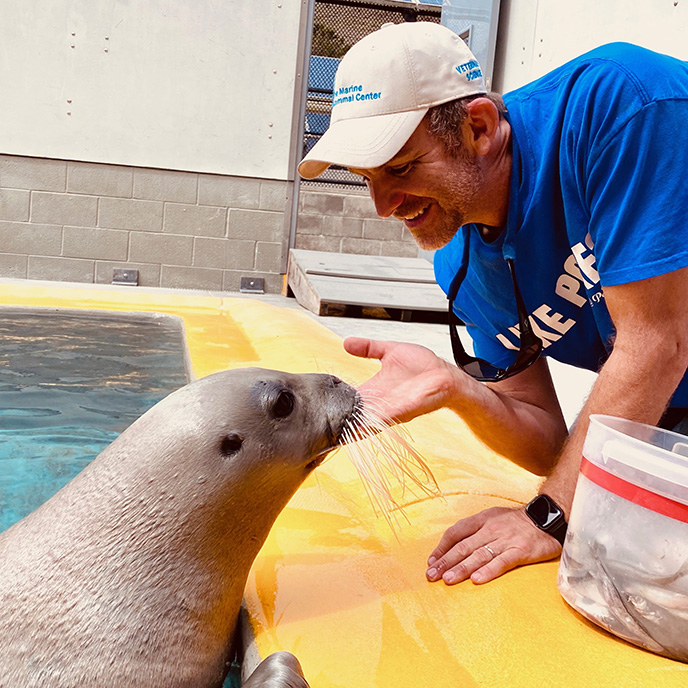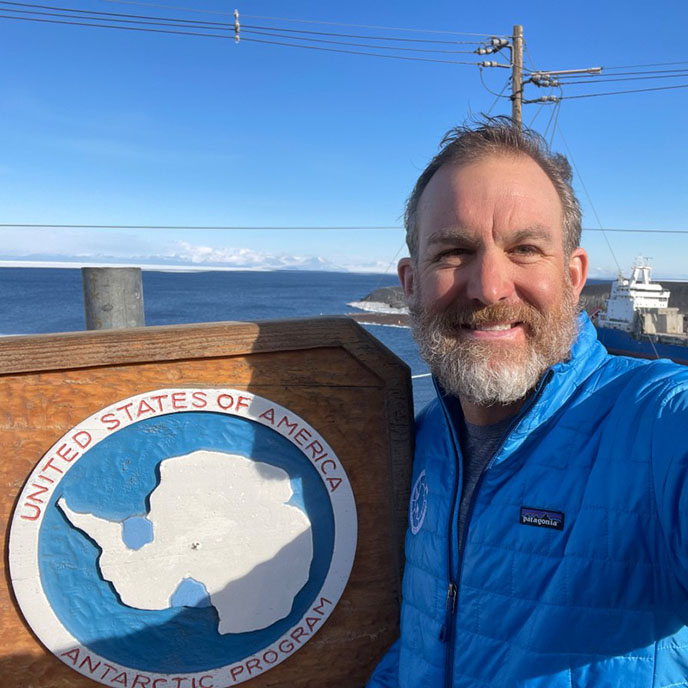

His decision to become a veterinarian was made early on. Dr. Shawn Johnson’s (’96) decision was also an easy one. Growing up in Colorado, his father had been a high school agriculture teacher. His family raised sheep and horses on their small family ranch.
“I was exposed to animal science early on in my life,” Johnson said.
But his ultimate career route was shaped not by life on the farm but from his summer vacations.
“My parents were originally from California, and we always spent summers and holidays there,” Johnson said. “That’s where I really became interested in the ocean and the animals who live there.”
That interest became more of a passion while working on his DVM at Iowa State with Johnson going all in. Today he is an expert in marine mammal medicine and anesthesia with over two decades of experience.
His career has taken him from Iowa State to working with marine mammals in the field around the globe. He has worked for the U.S. Navy Marine Mammal Program, the National Marine Mammal Foundation, Alaska SeaLife Center, and the Oiled Wildlife Care Network.
For eight years he led the world’s largest marine mammal teaching and rehabilitation hospital at The Marine Mammal Center. There he directed a large team of veterinary and scientific professionals in animal care, research and rescue of marine mammals.
These days, Johnson is the chief operating officer and director of innovative medicine at Sea Change Health, a company he started with his wife, Dr. Claire Simeone, also a veterinarian with expertise in marine mammal health and conservation.
“My passion is developing innovative treatments and techniques for marine mammal patients,” he said.
Johnson has nothing but praise for the education he received while at Iowa State.
“While at Iowa State I focused on getting a strong, basic education,” he said. “Dolphins are basically the cows of the sea.”
Despite being enrolled at a veterinary school in the middle of the nation’s heartland, Johnson said he wasn’t discouraged from pursuing his dream of becoming a marine mammal veterinarian.
“No one told me this was a bad idea,” he said, “although I was the oddball at Iowa State. My professors were not only intrigued by my career goals, they were also very supportive of what I wanted to do.”
And even though he was constantly pushing to learn more, taking a six-week preceptorship in Alaska, volunteering at aquariums and rehab centers, and serving as one of the first students in the U.S. Navy Marine Mammal Program, Johnson’s chosen career path is not one easy to break into.
“There are very few routes to get in this field,” he said. “I did relief work in California after I graduated and stayed in contact with people I had met in the profession.”
After working as an oil spill veterinarian for two years and then at the Alaska Sealife Center, Johnson’s career took off when he joined the U.S. Navy’s Marine Mammal Program as a civilian contractor. There he served as a clinical veterinarian caring for the Navy’s marine mammals.
Regardless of where he has worked, Johnson has been driven to solve the mysteries of the seas.
“There is so much we don’t understand about marine mammals,” he said. “I’m always trying to find ways to innovate, apply different technologies, develop novel treatments. I like to solve mysteries.”
Which is exactly what Johnson is doing at Sea Change Health, an organization dedicated to safeguarding ocean health, and all who rely on it. The organization has taken Johnson around the world including a recent stint with Weddel seals in Antarctica and sea lions in the Galapagos Islands. He and his family currently live in Valencia, Spain, and is a scientific collaborator with Oceanografic, the largest aquarium in Europe.
There Johnson is helping the Oceanografic’s veterinarians with marine mammal anesthesiology and developing a post graduate program to train future veterinarians in aquatic animal medicine.
“Like the rest of my career, it’s been a great adventure,” Johnson said. “I’m fascinated by the mystery of the ocean and what marine mammals do in the water.”
